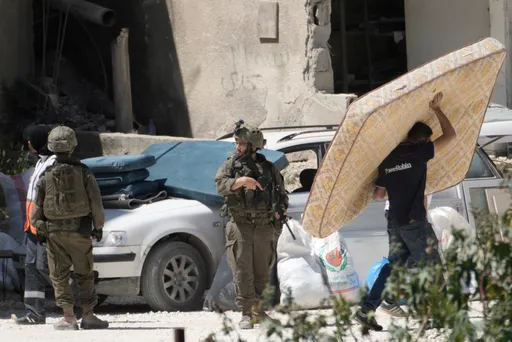Gaziosmanpasha, Istanbul - On the outskirts of Turkey’s economic capital, the human fallout from the coronavirus quietly reverberates throughout the city’s significant African immigrant community.
“The pandemic has created a lot of tensions and difficulties all around the world but as for us Africans living in Istanbul we are facing hardship like paying rent because I am still paying rent and there is no means of getting income anywhere as for now, workplaces have been closed,” says Alieu Barrie from Sierra Leone.
The 17-year-old Barrie has been living in Turkey for one year. Before coming to Istanbul, Barrie, who says both of his parents are dead, lived in Iran where he was promised a job and a chance to continue his studies by an Iranian he had met in Freetown, the capital of Sierra Leone.
“Instead I was enslaved to the lowest level for one and half years,” says Alieu to TRT World. “I managed to escape from Iran and some Afghani brothers helped me to enter into Turkey until I managed to connect with some of my Sierra Leonean brothers and sisters.”
“My own story is terrible,” says Barrie, who is now looking to find a good job, a decent salary, a decent place to live and above all else, “I want to be a legal refugee here in Turkey.”
Helping Barrie and people like him is a local organisation called Tarlabasi Solidarity Group (TSG) who, with a group of volunteers, are giving out aid to help recently laid-off workers.
Turkey’s working-class neighbourhoods
Several hours before Turkey’s major cities were unexpectedly placed under curfew on Friday for the weekend, the TSG was distributing much-needed aid to Istanbul’s African community.
What started more than 10 years ago as an organisation to help the struggling community of migrants and locals in one of Istanbul’s working districts from which it takes its name, has over time expanded to accommodate the growing need for assistance throughout the community.
Yasir Bodur and Muhammed Siddik Yasar, two longtime volunteers of the Tarlabasi Solidarity Group, packed their car with face masks, hand sanitiser, plastic gloves and prepaid food cards.
Through his extensive contacts within the African community, Yasir spoke with African community leaders in Istanbul and compiled a list of people who are in need of protective equipment.
“During this period some in the migrant communities are not able to access health insurance or they can’t earn money because the factories are closed. This is why we are trying to distribute some aid,” says Yasir.
TSG offers access to volunteer doctors, who are members of the organisation and can give assistance and even consultation over the phone to immigrants in either English or Turkish.
Yasir, who is wearing medical gloves, a face mask and a plastic face shield says: “Today we will deliver to Gaziosmanpaha, where there are more than 300 members from the Sierra Leonean community.”
A list of people from the working-class neighbourhoods of Fatih, Gaziosmanpasa, Esenler and Kagithane - all with significant migrant communities - makes up a list of more than 2,000 who have registered to take advantage of the aid being given by TSG.
“We try and collect as many details as possible about all the different houses we should visit. If we give aid to the community leaders they might try and rush there. So we go house to house,“ added Yassir.
Gaziosmanpasa, a working-class neighbourhood, has always been host to first-wave migrant communities seeking to make a better life in the city. During the 1960s and 70s, there were waves of internal migration from Anatolia and cities like Adiyaman as urbanisation slowly took hold in Turkey.
More recently the area has seen an influx of people from West Africa seeking to take advantage of the employment opportunities provided by the area's small and medium-sized textile factories.
Falling between the cracks
Istanbul is the city most impacted by the spread of the coronavirus, according to Turkey’s Minister Fahrettin Koca, and its working-class neighbourhoods are facing the highest rates of infection.
Unlike white-collar professionals, the working, or labour class, don’t have the privilege of working from home. Often in the services sector or in the construction industry, they risk leaving the home to make ends meet.
The Turkish government, as part of a package of financial measures aimed at softening the blow from the outbreak, has given two million households a one-off 1,000 lira ($147) stipend, however, many in the migrant community are unlikely to benefit from this.
Many migrants, some of whom are working and living in the country illegally, have irregular jobs and their day-to-day work is essential to feed themselves and pay the rent. It also creates opportunities for the virus to spread - a factor TSG is trying to mitigate.
Travelling to different households, Yasir explains the importance of social distancing and how the virus spreads. TSG has prepared educational leaflets in Turkish, English and French that explain the symptoms to look out for.
The importance of social distancing is highlighted and then protective equipment is given out alongside a prepaid food card while the temperature of the members of the household is taken using a handheld infrared thermometer gun.
Over the years TSG has gained particular insight and won the trust of African community leaders, and as a result, many from the Sierra Leonean community are receptive to listening to the advice.
“Since many of the local textile factories have been closed, landlords are asking us to pay rent and now we are not working,” says Bia Kamara, from Sierra Leone.
Kamara has been living legally in Turkey for more than two years and was the first person to move into Gaziosmanpasha from the Sierra Leonean community and is now one of the leaders of the community in the area.
“We need landlords to show understanding at this particular time. None of us is working, all of us have no jobs and are in the house but we don’t have any way of getting money,” added Kamara to TRT World.
While some of the workers TRT World spoke with are legally working in this country many others were not and offering a measure of support in these exceptional times will be important in battling the coronavirus.
“Many workers that have been laid off still try and look for jobs in order to make ends meet,” says Yasir. “Some travel around looking for textile businesses who are open and seeking employment, we are trying to speak with them and tell them to stay at home and where possible offer assistance.”
Barrie who, alongside his native language of Krio, also speaks English, Farsi, some Arabic and some Turkish, wants to formalise his place in Turkey and dreams that his life will become better.
“I will like to be a student of knowledge and to serve Turkey in different skills,” he says.























